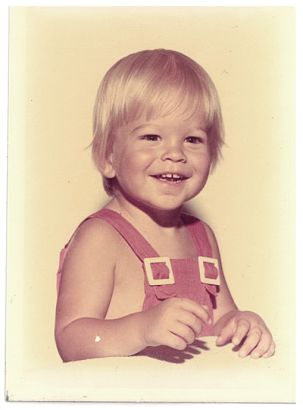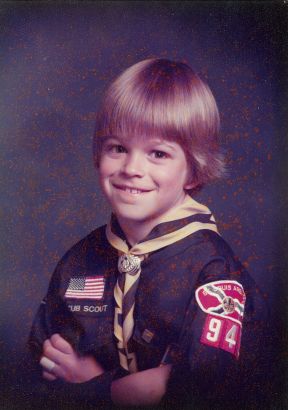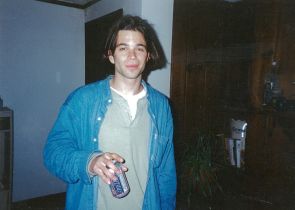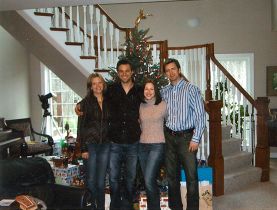We are a group of creative people who help organizations make their ideas beautiful.
Brad
Hauck
When writing about one Brad Hauck, the smartest thing you could do is let him do the writing for you.
Not because he has some uncanny sense of self, but because the man’s storytelling is inimitable. That being said, we like to give Brad a hard time. What—do you think we’d just let him walk around with a completely healthy amount of pride? No, no. We’ll spin our own thread before turning the scribed mic over.

This is Brad and his wife, Rachel. He frequently refers to her as the “love of my life” and if you’ve seen them together, you’d call her that, too. She is a project coordinator in the research department at Washington University and wears really soft sweaters. They have one son, Chris, who is about to head to college.
Brad is our VP of Creative Strategy. Spend some time in a creative review, and you’ll hear him measure the merit of ideas by their tension. The best campaigns, he posits, force two competing ideas into a boxing ring and figure out how they both win. Brad champions paradox, because Brad is paradox. And there’s some wordplay on Paradoxski to be found there, but this is about Brad and we shouldn’t get sidetracked even though he totally would.
This, in turn, is how he coaxes strategic marketing from our clients. It’s easy to start talking about the future, but staring into the unblinking eyes of the current state of things can often take a cast-iron stomach. Brad sits with you like the unjudging therapist who you swore you’d only see once and not get into all of that. He knows that your product can be good and performing poorly, or blue and selling like it’s green. The only way out is in, with a little magic.
Part of what we’ll call “The Hauck Effect” can be found in his gift of gab. In truth, it can be traced through the bloodline to his father, Rick Hauck. Rick came from one of those large, blue-collar, German-American broods. He was the first of the family to go to college, and did so on a partial football scholarship. While there, he reconnected with his high school friend, Lynn, and the two fell in love and started a family in North County, St. Louis. Brad’s birth was followed by a brother (Andy) and a sister (Erica), while Rick worked his way up as an insurance underwriter. He later became president of a benefits consulting firm.

As a child, one might think Brad’s love of creative wordplay came from his mother: a trained ballerina who went to college for visual art. But it was Rick, through and through.
Fast-forward past Brad’s University of Missouri education in English Literature and Creative Writing. Through the afternoon he revealed his dream of being a famous poet to his poetry professor who replied, laughing, “I just had my most successful year and made $735.” Then we’ll land at a wedding where Rick’s boss pulled Brad aside and asked, “Do you talk like your dad? When your dad talks, people just listen. Do you have that?” So whenever you, dear reader, fall under the Hauck Effect, know that you are up against generations of skill.
Now, we promised to let Brad talk a bit. So here he is on love, marketing and Paradowski.
CS:
You and your now wife started dating one November and were married that August, although you said before that you were somebody who avoided commitments. What’s the key takeaway there?
Yeah, the people who knew me sort of had whiplash. I was never a quick decision-maker when it came to relationships at all. But if we’re honest with ourselves, I think we don’t have total control over that. I think I’m usually pretty analytical about important things. But at the same time, some things transcend analysis and marriage is one of those things. I think that’s a pretty good indicator of whether a relationship is right. Like, if you find yourself analyzing (whether you should get married), then you kind of already have your answer that it’s not right. With Rachel, marriage was just immediately the thing I wanted to be lucky enough to do.
(I’m not crying. You’re crying.)

CS:
You got your start in Chicago, where you did B2B advertising for 3 years. Do you think this helped guide you to your current role as strategist?
BH:
I would say that’s fair. The one thing B2B forces you to do is think very carefully about your audience. When you’re working on consumer-facing stuff, you don’t have to stretch your imagination very much to imagine that you’re 40 instead of 31, for instance. But if you’re doing B2B, you have to work pretty hard to gain a baseline understanding of someone’s very specific professional perspective. I can imagine what it’s like to be someone who buys Axe Body Spray, even though I’m not that person. But I can’t imagine, instantly, what it’s like to be a radiologist or farmer or a veterinarian. That takes a lot of research.
CS:
You’ve helped Paradowski shift from a design studio to a full-fledged advertising agency in your 6 years here. What do you seek in employees to keep the brand on the right track?
BH:
One of the first things that I’m always looking for is someone with a healthy sense of perspective on what they’re doing. I look for people who understand that there is a higher order to the value of our creativity. We’re not pursuing creativity in order to “be creative.” We’re using creativity as a way to solve difficult problems. At first, for some young creatives, that can be a comedown. But it’s a lesson you eventually have to learn, and it makes you much better and it frankly makes it a lot more fun and challenging. If a creative walks me through his or her book and can’t articulate why they were excited about the client or the audience, that’s a turnoff. They need to tell me why it matters.
The other thing I’m always looking for is a desire for autonomy. Paradowski is good at a lot of things, but we’re historically pretty bad at having a rigid or proven process. I’m always seeking out people who appear to be good at figuring things out for themselves. And, in general, I like to hire humanists—people who put the dignity of other people on a very high pedestal. Our industry tends to treat people as a part of a demographic, or as a collection of habits. We need to see people as individuals who first and foremost want to be treated with respect. I think that’s why our work tends to be beautiful. I know I’m biased, but I think we design things to make people feel better. Advertising could use more of that.

CS:
What’s one thing you would change about Paradowski?
BH:
I think we really need to be a little more experimental with what the value of a group of people like us can be. We’re still very much assignment takers, and I think every agency is. But the skills of a group out there that’s creating movies or developing new products—in general, those are the same skills we have. They’re adding to the culture, and not just riffing on it. We need to take steps toward that. The biggest thing is, it’s really a mindset where we’re investing a substantial portion of our time into things that don’t have a specific paycheck attached, but bring up the culture and will be profitable down the line. Andy’s already doing a lot of that. The organizations that force themselves to do that are the ones that will define what this next era of advertising looks like.











